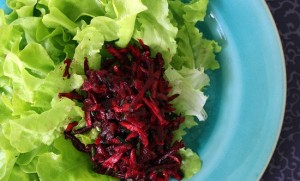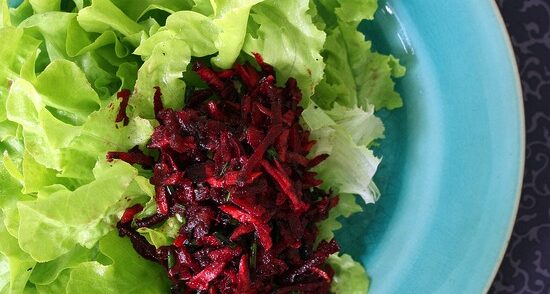Healthy Eating: Planting the Seed
 Mo’ meat, mo’ problems? That’s the premise of documentaries like Forks Over Knives, which explore the theory that animal-based and processed foods lead to degenerative disease and other health issues. “Films such as Forks Over Knives, Food Inc. and Fast Food Nation have heightened awareness about our nation’s food system and persuaded viewers of benefits of a plant-based diet,” says Jennifer McDaniel, MS, RD, and spokesperson for the Academy of Nutrition & Dietetics.
Mo’ meat, mo’ problems? That’s the premise of documentaries like Forks Over Knives, which explore the theory that animal-based and processed foods lead to degenerative disease and other health issues. “Films such as Forks Over Knives, Food Inc. and Fast Food Nation have heightened awareness about our nation’s food system and persuaded viewers of benefits of a plant-based diet,” says Jennifer McDaniel, MS, RD, and spokesperson for the Academy of Nutrition & Dietetics.
The popularity of such films—coupled with a mass movement toward healthier eating—points to an overall trend: plant-based diets are hot. A 2012 Vegetarian Resource Group survey found that 7.3 million Americans are vegetarian, while 22.8 million others follow a vegetarian-inclined diet. “More people are interested in meatless meals some of the time. They may not be complete vegetarians, but they are interested in moving in that direction,” says Sharon Palmer, author of The Plant-Powered Diet.
Why make the shift? Research has shown that bioactive compounds found in plant foods can reduce inflammation and damage to cells, cutting down the risk of chronic diseases like cancer. Plant-based diets have also been documented to keep you leaner and keep lifestyle diseases like diabetes at bay. And, along with long-term health benefits, it may also boost endurance—a welcome development for any all-star athlete.
Of course, plant-based diets are nothing new among performance-centered athletes. Just ask legends Joe Namath, Martina Navratilova, Billie Jean King, Desmond Howard and Carl Lewis—all of whom don’t eat meat. And while many school-aged athletes might consider fast food to be one of the major food groups, others might be intrigued by the idea of going flexitarian, vegetarian or full vegan. We asked the experts for their tips on making this lifestyle change work for all-star cheerleaders:
Keep the energy flowing: Long practices and intense competitions call for a high energy level, and athletes who rely too much on vegetables might develop an energy lag. To prevent sluggishness, McDaniel suggests incorporating foods like legumes, soy products, grains and healthy fats like nuts, avocados, seeds and olive oil into the daily diet. “[Athletes] need to make sure they are getting adequate calories, and not just veggies and fruits,” advises McDaniel.
Pacify the palate: Transitioning to a plant-based diet can be tough. “Those in transition can try some of the alternative meats or plenty of tofu, all of which are high in protein and fat,” says Jack Norris, RD, and author of Vegan for Life.
Get your fill of nutrients: People on plant-based diets can miss out on some nutrients, such as iron and vitamins. “Because the plant-based form of iron is not absorbed as easily as iron from meat, vegetarians need to eat plenty of iron-rich foods,” says McDaniel. To remedy this issue, McDaniel suggests eating lots of beans, greens and fortified foods every day. Also, Vitamin C helps the body absorb iron, make sure the refrigerator is stocked with strawberries, oranges and tomatoes.
Vitamin B12 and Vitamin D can also present a challenge. The human body can synthesize Vitamin D when exposed to sunlight, but to get enough Vitamin B12, it’s all about eating more fortified foods. As for calcium, those who don’t eat dairy products will have to obtain their necessary calcium quota from calcium-rich soy products and dark leafy greens.
Keep the focus: Hungry athletes will have to avoid snacking on junk food when they don’t have easy access to plant foods. “Snacking on whole foods and snacks made with whole foods is key,” says Kate Geagan, author of Go Green, Get Lean. She suggests keeping Justin’s Nut Butter packs handy for high protein nourishment on the go. Other healthy snacks include peanuts, walnuts, kale chips, fruit smoothies and granola bars.
Most importantly, remember that this diet isn’t for everyone. Put your athletes in touch with a dietician who can chart out a diet program tailoring to their individual needs before they embark on any diet.
Other Plant-Based Diets
Not ready to go totally vegetarian just yet? Try these diets:
Semi-vegetarian (or Flexitarian): This is mostly a plant-based diet with meat meals thrown in once in a while. Go for Meatless Mondays!
Pescetarian: Fish are the only animal product consumed on this diet. This is a great way to get your protein and omega fatty acid retirements fulfilled—but keep an eye on mercury exposure.
Lacto-ovo vegetarian: People on this diet eat no meat, but consume milk and eggs. (Translation: no calcium and vitamin B12 worries.)
–Dinsa Sachan









Laura Slitt
September 25, 2013 @ 2:30 pm
As a robust advocate for plant centered nutrition, more for ethical and environmental reasons, the hospital near me is open to listening to any suggestions I might have, regarding healthy foods.
Since sports will always be the holy grail, I think organizing an event around sport nutrition for the young athlete is a great place to begin.
Perhaps there are vegan athletes that might be willing to visit this most beautiful resort area and speak on this topic?
We might combine with a couple chefs and some vegan food vendors.
Hope I can find some assistance .
Humbly and Gratefully